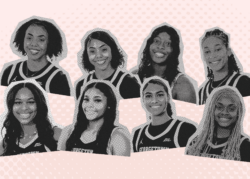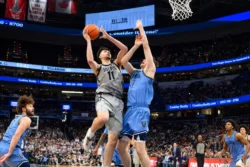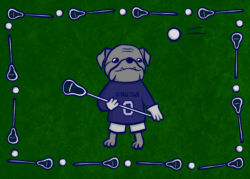There are two genders in our world: the male and the female. By and large, the male enjoys viewing sports more than the female, for the simple reason that if he can’t talk about sports effectively at a young age, he will be cast aside by the masses. A case in point of this situation: In the summer before sixth grade, when I was a hugely fat, zit-infested kid who wore striped clothing way too much and talked with a lisp, I went to a summer program geared towards really smart kids. “Great,” I thought. “This is a beautiful chance for me to meet more and more nerds just like me, who talk with lisps, have blankets named Silky, own more than 20 stuffed animals and outweigh several moons of Jupiter.” Surprisingly, though, there was a group of cool kids at this camp, and I found my place with them by knowing about Dale Murphy, the biggest stud on the Atlanta Braves throughout the 1980s. Simply being able to discuss his statistics found me in the group.
At some point, all males realize that sports knowledge equals acceptance, whether it be age 12 or age 55, and they begin to care about meaningless combos of letters, like OBP or ERA, or FTA or, God forbid, BCS. In order to understand what these mean, however, you need to watch sports. So, males do that.
Females, by and large, don’t care about men named Ichiro or boys named El-Amin. When girls are young, the fat, striped-shirt wearing among them gain acceptance by being able to make fun of the boys who emotionally scar the blond, skinny, more vacuous and attractive leader of the pack. (If you take offense with this idea, please don’t hesitate to contact every single film director who has ever made a movie involving teenagers, but not me.) As we also know, the fat girls end up scoring the cool guys by knowing about the career trajectory of Tony Battie, but that happens at a later date, and does not apply to this meandering narrative.
At this point, however, a clear problem arises. Boys like to view sports; nay, they need to view sports. It brings them closer to other men, to their fathers and to their failed boyhood dreams. Women, however, do not like to view sports. So, how does a relationship ever work? There are several key ways:
One tactic, employed by some, is to educate your significant other about the inner workings of the games and participants on the glowing magic that is your television. The obvious plus here is that, assuming she pays attention, she’ll at least know Ken Simonton from Ken Dorsey, and that should get you through a game or two. The major drawbacks, however, are plentiful. This time and effort is often fruitless, as many significant others will simply not care about what you’re telling them, and the time you’re spending is time away from grunting out the names of obscure MLS players in a room full of your “crew.” In turn, this “crew” will grunt the same name until everyone is satisfied with how close they truly are, yet could never express. And honestly, who wants to cut into that experience by teaching a girlfriend what the 46 defense is?
You could always propose the “separate corners” compromise. Under this extremely tense guideline, you propose that the woman take a walk?to be very stereotypical, let’s say “to get her hair done”?during big games. Perhaps, if your job isn’t dead-end, you even provide her with funds for this hair session. While this is a noble gesture, and Lord knows if your girlfriend ever gave you 40 bucks to hit a sports bar while the girls were over watching Sex and the City you would most assuredly take it, girls do not view it that way. When you propose this “separate corners” treaty, you are putting something?competitive, televised athletics?ahead of the love of your life. This is not something that results in happiness, or continued involvement, for the alpha male.
Honestly, there is only one solution to the woes that sports causes the relationship, and one man we should all worship as a deity: Ron Shelton. Shelton makes movies about sports AND relationships, such as Bull Durham and Tin Cup, cinematic lore that females appreciate for the character development in the love story, and that males appreciate for the notion that Kevin Costner could ever drive 400 yards. Ron Shelton bridges all communication gaps and brings sports down to a level easily understood by both genders at all times.
So, when March Madness comes around, and you can’t explain to the love of your young life how cool it is that 64 becomes 16 in just four days, head on over to the movie store, grab White Men Can’t Jump and put it in?but before the games begin coming in from the East Regional. It will solve everything.





